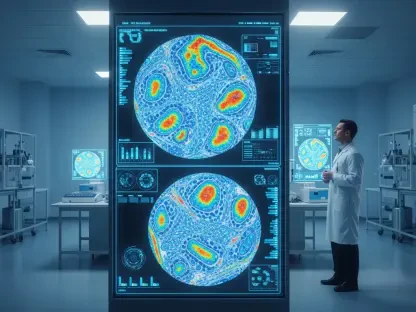In the rapidly evolving field of biopharmaceuticals, the ability to harness data effectively can be the difference between groundbreaking discoveries and missed opportunities. The importance of advanced data management systems cannot be overstated, as they form the backbone of AI-driven insights and innovations. Just as modern technology is attempting to virtually unroll ancient scrolls buried by a volcanic eruption in 79 CE, biopharma companies must ensure their data is well-preserved and structured to be ready for future AI applications. Unorganized or corrupted data can render the entire analysis process futile, regardless of the advanced technological tools available.
The Value of Archival Data
Archival data, often stored to validate intellectual property claims or meet regulatory requirements, is an untapped goldmine. When analyzed using machine learning models, this data can provide new insights that may have been previously overlooked. However, many data science departments spend a substantial amount of time attempting to make this data usable. Common practices include dumping unusable data or painstakingly cleaning and organizing it for future use. Companies that preemptively save data in multiple open formats avoid corrupted files, much like modern-day parchment conservation efforts with ancient scrolls, ensuring their valuable information remains accessible and intact.
Despite the potential wealth of insights stored in archival data, many biopharma companies struggle with significant challenges in data management. The process of cleaning and organizing data to make it usable is often time-consuming and resource-intensive. Moreover, improperly stored data can become useless or corrupted over time, rendering it ineffective for AI and machine learning applications. Adopting robust data management practices is essential to ensure the integrity and accessibility of data. By doing so, companies can overcome these challenges and unlock the full potential of their archival data, paving the way for innovative advancements and discoveries.
Preparation for Future AI Utilization
For AI to be genuinely useful, data must be complete, include necessary context, and be recorded systematically. This involves capturing enough data, including negative and null results, to create comprehensive machine learning models. Ignoring failure data can skew predictions and lead to incomplete or misleading results. Additionally, capturing finer details such as the instruments used, sample batches, and specific experimental conditions can provide critical context for future studies. Legal considerations, such as thoroughly documenting any restrictions on data usage or storage, can also save potential complications and ensure smooth, lawful operations later on.
A crucial part of preparing for future AI utilization is to ensure that the data is meticulously detailed. This level of recording goes beyond basic experimental conditions and includes all relevant elements that can impact results. By systematically capturing all these details, biopharma companies can contextualize future studies, leading to more accurate and insightful AI-generated predictions. Legal requirements must also be considered, as they play a fundamental role in maintaining trust, compliance, and the lawful usage of data. Comprehensive data recording paves the way for robust and reliable AI models, enabling companies to make informed decisions and achieve scientific breakthroughs.
Consistent Data Formats
Standardizing data formats across datasets is vital for ease of data manipulation and cleaning. Using consistent formats, such as ISO time and date standards, can significantly streamline the data management process. Automated systems that enforce standardized data entry and accurate capture can alleviate the added time required for comprehensive data capture, ensuring data integrity is maintained. These systems facilitate data consistency and reliability, making the data readily available for future AI applications. Standardization enhances the efficiency and effectiveness of data analysis, allowing companies to unlock the full potential of their datasets and derive valuable insights from their data.
Implementing automated systems to enforce data standards offers a solution to the time and effort constraints often faced by biopharma companies. These systems ensure that data is consistently formatted and accurately captured, significantly reducing the resources needed for future data manipulation. By investing in such automated systems, companies can ensure their data is accessible, usable, and ready for AI-driven insights and innovations. This practice of maintaining consistent data formats is a critical step in the data management process, ultimately supporting the advancement of AI applications and driving operational efficiency within the industry.
Trend Toward Data Stewardship
The biopharma industry is increasingly recognizing the importance of good data stewardship. Companies that invest in robust data management systems and foster a culture respectful of data’s future value are more likely to harness AI’s full potential. This trend reflects a growing acknowledgment of the critical role that well-managed data plays in driving scientific breakthroughs and innovations. Investing in data stewardship practices ensures that data is not only preserved but kept in a state that is readily accessible and useful for future applications. By adopting best practices in data management, biopharma companies can position themselves to make the most of AI-driven insights and innovations, leading to significant advancements in the field.
Fostering a future-oriented culture of data stewardship requires a commitment to understanding the long-term value of data. Companies must view their data as a strategic asset, investing resources to ensure its longevity, accuracy, and accessibility. This mindset shift towards data stewardship can unlock substantial scientific benefits, enabling AI technologies to analyze data more effectively and generate more meaningful insights. By embracing data stewardship, biopharma companies can be prepared for rapid technological advancements and maintain a competitive edge in the industry.
Capturing Comprehensive Data
Good machine learning models are only as insightful as the data they are fed. Therefore, capturing the full spectrum of data, including negative and null results, is crucial. Failure data, if ignored, can skew machine learning predictions, leading to incomplete or misleading results. AI relies on this failure data to improve its predictive accuracy, and without it, critical connections may be missed. By capturing comprehensive data, including all relevant outcomes, biopharma companies can ensure that their AI models are robust and reliable. This comprehensive data approach increases the likelihood of discovering meaningful and actionable insights that can drive progress in the biopharmaceutical industry.
Capturing comprehensive data involves systematic and thorough data collection processes. It is essential to ensure that no detail is overlooked, regardless of its perceived significance at the time of collection. This practice covers not just successful experiment results but also those that did not yield the expected outcomes. Such diligent data capture can significantly enhance the quality of AI predictions and enable models to learn from a wide range of scenarios. When comprehensive data is collected and managed effectively, biopharma companies can develop better-performing AI systems that contribute to more accurate and insightful discoveries in the long run.
Contextual Data Recording
Beyond the immediate conditions necessary for experiments, capturing finer details such as the instruments used, sample batches, and specific conditions can profoundly impact the utility of the data for future research. Contextual data recording ensures that all relevant factors are considered, providing a deeper understanding of the results and allowing AI models to generate more precise and actionable predictions. Additionally, documenting any restrictions on data usage or storage can prevent potential legal complications, ensuring compliance with regulatory standards. By thoroughly recording and documenting all contextual data, biopharma companies can create a comprehensive and rich dataset that enhances the effectiveness of AI applications.
The importance of capturing comprehensive contextual data cannot be overstated. Detailed and accurate records of every experimental aspect help construct a complete picture of the conditions under which data was generated. This detailed recording allows future researchers to replicate studies accurately and understand the nuances of different experiments. Moreover, regulatory compliance is crucial, and thorough documentation ensures that any legal and ethical considerations are met. By prioritizing contextual data recording, biopharma companies can significantly improve their data’s usefulness for AI applications, leading to more informed and reliable insights.
Standardizing Data Formats
For ease of later data manipulation and cleaning, using consistent formats across datasets is essential. Standardizing data formats, such as ISO time and date standards, can significantly streamline the data management process. Automated systems that enforce standardized data entry and accurate capture can alleviate the added time required for comprehensive data capture. These systems ensure that data is consistently formatted and readily available for future AI applications, ultimately enhancing the efficiency and effectiveness of data analysis. Standardization is a crucial practice that ensures the seamless integration of data into AI models, which in turn, drives better research outcomes and innovations.
By adopting standardized data formats, biopharma companies can reduce variability and enhance data comparability across different datasets and studies. This uniformity allows for more efficient data merging, cleaning, and analysis, facilitating the construction of more robust AI models. Automated systems support this standardization effort by minimizing human error and improving the accuracy of data collection processes. Investing in technologies and practices that promote consistent data formatting is essential for any biopharma company aiming to harness the full potential of AI-driven insights and advances.
Embracing a Future-Oriented Culture
In the fast-paced world of biopharmaceuticals, effectively utilizing data can distinguish between groundbreaking discoveries and missed opportunities. The significance of advanced data management systems cannot be overstated, as they underpin AI-driven insights and innovations. Just as contemporary technology aims to digitally untangle ancient scrolls buried by a volcanic eruption in 79 CE, biopharma companies must ensure their data is meticulously preserved and organized for future AI applications. Disorganized or corrupted data can undermine the entire analysis process, no matter how advanced the technology is. These systems need to be robust, allowing scientists to focus on research rather than data retrieval and integrity issues. With clean, well-structured data, AI can uncover patterns and insights previously unimaginable, pushing the boundaries of what’s possible in medicine and patient care. Therefore, investing in sophisticated data systems isn’t just beneficial—it is imperative for driving future success in biopharmaceuticals.









